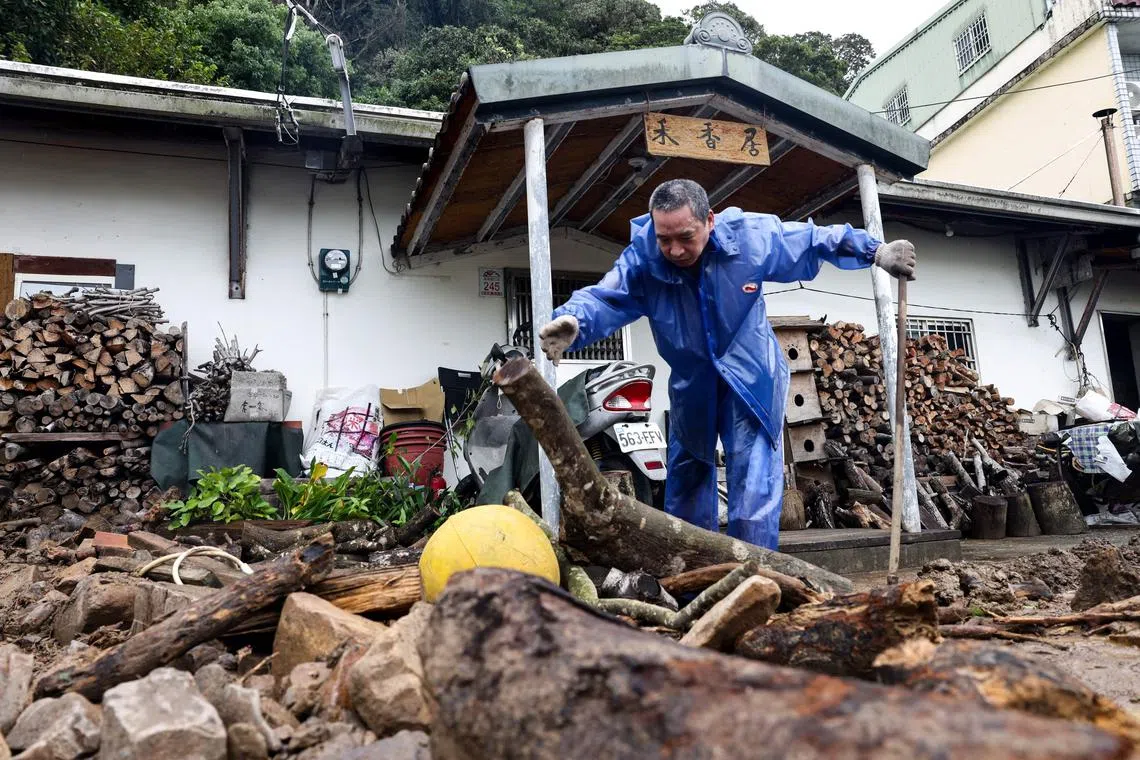askST: A natural disaster hit the area I was holidaying in. Will my travel insurance cover me?
Sign up now: Get ST's newsletters delivered to your inbox

A resident clearing debris in Yilan, Taiwan, on Nov 1 following a landslide caused by Typhoon Kong-rey. Popular tourist destinations such as Japan, Taiwan and Thailand have been hit by deadly natural disasters in 2024.
PHOTO: AFP
Follow topic:
SINGAPORE – It is that time of the year again to escape the hustle and bustle of school and work – perhaps for a snowy Christmas in the mountains of Japan, some peace and quiet on the beaches of Thailand, or to satisfy cravings for street food in Taiwan.
These destinations, though undisputedly popular among both young and old Singaporeans, are among several places that have been hit by deadly natural disasters in 2024.
On New Year’s Day, a 7.6-magnitude earthquake struck central Japan
The earthquake in Taiwan in April
A Singaporean couple went missing
The Straits Times spoke to the General Insurance Association of Singapore (GIA) and four insurance companies to find out how travellers can best protect themselves and what to look out for when buying travel insurance.
1. Why should I get travel insurance?
Industry experts said travellers need to be adequately insured in case they need medical treatment overseas.
MSIG senior vice-president of technical services Jeremy Lian said medical expenses were among the top three types of claims by its travel insurance policyholders in 2023, and the amount claimed for such expenses was the “most significant”.
“Without travel insurance, the cost of urgent medical treatment and medical evacuation can be prohibitive and beyond the means of the average traveller,” he added.
There have been reports of uninsured travellers resorting to crowdfunding to cover their emergency medical evacuation or overseas medical expenses in recent years, said a GIA spokesperson.
The spokesperson added that GIA has observed an increasing number of reports of climate change-related extreme weather events globally, and how they have led to travel disruptions and casualties.
Travel delays, trip cancellations and trip disruptions are the most common reasons travellers give when making travel insurance claims related to acts of God and natural disasters, said insurance companies approached by ST.
Acts of God refer to events that are outside human control.
MSIG Insurance (Singapore) has seen a double-digit increase in such claims in the past year, while Singlife has also experienced a jump in such claims between 2023 and 2024, their spokespersons said.
“With the year-end travel season, we strongly urge all travellers to have proper travel insurance coverage when travelling overseas,” said the GIA spokesperson.
2. What is a known event, and am I covered for such events?
The terms and conditions of travel insurance policies may include a section on known events.
Known events refer to incidents that threaten your health or disrupt your trip, such as riots, strikes, civil commotions, natural disasters and pandemics, according to information found on Budget Direct Insurance’s website.
To be considered a known event, it must either have been reported by the media, or a travel advisory must have been issued by an authority, before you buy your policy.
Generally, insurers do not cover known events, said Mr Lian of MSIG.
“If customers purchase their travel insurance after an earthquake has occurred (at their destination), they would not be covered for claims related to the earthquake and its aftermath,” he added.
“However, the policy would cover claims unrelated to the event, such as baggage damage, loss of travel documents and food poisoning.”
But a traveller would still be covered, according to the policy’s conditions, if he had bought a policy before a natural disaster happened, and there is no government travel advisory against travelling to those destinations, said Ms Annie Chua, vice-president and head of key accounts management at Income Insurance.
3. What are some things to look out for when buying travel insurance?
Travellers should take note of the policy’s benefits, its limits and exclusions and any special conditions, said Mr Alvino Kor, senior vice-president of general insurance at Singlife.
There are also riders to consider, such as coverage for winter sports or water sports, he added, and travellers should make sure that the scope of coverage in the policy is enough.
“For instance, if you are travelling to European countries or the US, it is highly recommended that you purchase a plan with higher limits to ensure that you are adequately covered in the event of an incident,” Mr Kor said.
Other factors to consider include pre-existing illnesses, or if travellers are travelling to, or through countries that are usually excluded by insurers, said the GIA spokesperson.
The spokesperson said premiums may be higher for some travellers, such as those with pre-existing medical issues, as they would need more cover than a typical traveller.
Travellers should also buy their policies early, said Ms Chua of Income Insurance.
Travel insurance can be bought up to 180 days before a trip, with travellers covered if something happens between the date of purchase and the travel period, such as trip cancellation.
“It is important to carefully review the policy to ensure that your needs are covered,” said the GIA spokesperson.
”If you are not clear on any part of the insurance, it is best to clarify with the insurer the specific part of the policy.”


